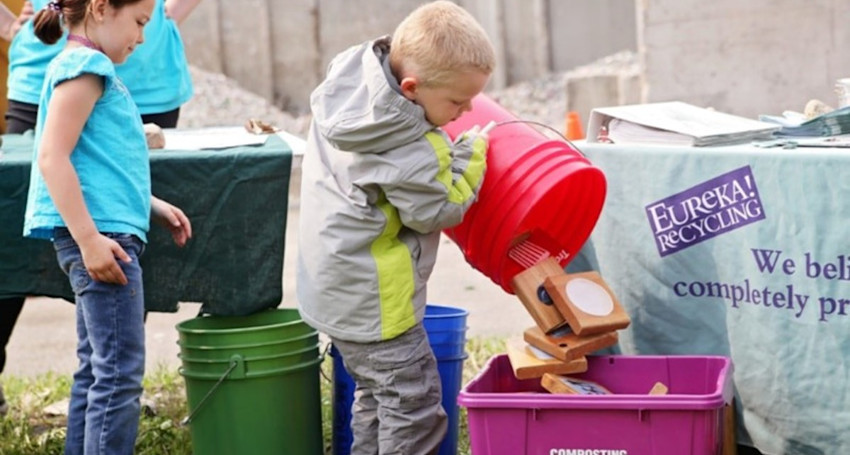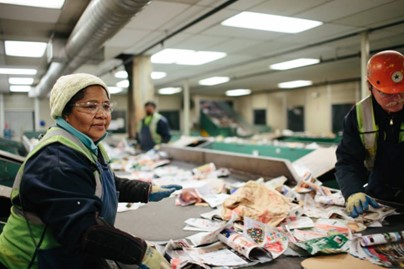
Eureka Recycling provides direct curbside recycling pick-up services in Lauderdale, Roseville, Shoreview, and Saint Paul, Minnesota.
Success Story: Eureka Recycling
September 20, 2023
Introduction – Calvert Impact’s history with Eureka Recycling
In 2016, Calvert Impact provided financing to Eureka Recycling, a zero-waste nonprofit based in Minneapolis, Minnesota, through the Community Investment Note® portfolio. Eureka Recycling is dedicated to demonstrating that waste is preventable – not inevitable – and has provided recycling services and education to the Twin Cities since 2001.
Eureka Recycling is one of only four nonprofit recyclers with a Zero Waste mission in the US that provides curbside recycling collection service to residents. As one of those four, Eureka works to bridge the gap between the vision for a Zero Waste future and the realities of today with tangible, real-world solutions. They are modelling the idea that by systematically addressing the way we manage our resources, we can create solutions to the most pressing issues of our time, including climate change, building strong local economies, and supporting healthy equitable communities. From the 400 ton daily pile of recycling collected and sorted at their MRF (Material Recovery Facility) every day, Eureka looks “upstream” at how products and packaging could be redesigned to be more resource-efficient, made from recycled content, recovered more easily, reused, or simply eliminated.
Eureka also looks “downstream” at how systems and infrastructure could better recover and remanufacture materials into new products. They conduct zero waste studies, advocate for recycling policies on local, state and federal and even global levels, engage their local community through their recycling facility tour program and Zero Waste events, engage with stakeholders along the packaging supply chain, and provide employees with living wage opportunities and benefits.
Eureka, alongside the other three US nonprofit recyclers, founded the Alliance of Mission Based Recyclers (AMBR) in order to reveals facts and myths about how recycling works, model innovative policies and practices, and influence the national recycling narrative and dialogue by leveraging their collective operational experience, relationships, reputations, and unique voice to drive systemic change.
Our 2016 loan to Eureka was part of a participation facility led by RSF Social Finance in tandem with co-participant Closed Loop Fund, a New York investment firm dedicated to creating a circular economy. The purpose of the facility was to expand Eureka’s MRF and help them purchase a more efficient truck fleet to meet the needs of their contract with the cities across the Twin Cities metro area. Eureka’s MRF is the 40th largest recycling facility in the country, processing 110,000 tons of material annually.
How did our loan have an impact on Eureka Recycling and the communities they serve?
In 2016, Eureka won a new 5-year contracts with the City of Minneapolis and the City of St. Paul, as well as contracts with several other suburbs and haulers, requiring them to process 50% more recycled material than they were originally processing before 2016. To fulfill these contracts, they needed a new fleet of trucks and to make a substantial upfront investment in their MRF to upgrade their single stream recycling system and improve its sorting capacity. To finance these upgrades, Eureka turned to RSF Social Finance.
RSF was already lending to Eureka at the time, but could not meet their full capital needs, so they approached Calvert Impact and Closed Loop Partners to help fund the full participation facility. As Co-President of Eureka Recycling Kate Davenport puts it, “The RSF facility was critical in enabling us to double down on investing in the recycling facility and purchase new equipment which more than doubled the amount of material we could process.”
The facility was not only important to fulfilling Eureka’s full financing needs, but also helped RSF build out their participations business line. As RSF’s former VP of Lending Mindy Christensen noted, “The Eureka participation facility was critical in helping RSF build capacity and appetite for arranging more participations for our borrowers. This first facility enabled us to take on more, larger facilities that we would have likely passed on in the past.” Calvert Impact also helped to clarify the impact metrics that Eureka reported to the co-lenders and informed the analysis and monitoring of those metrics.
With the backing of RSF, Eureka was able to build even more credibility among traditional lenders. Though they had accessed traditional financing in the past, they found traditional banks less willing to lend in the years following the Great Recession, and began working with RSF in 2013. When RSF helped structure the 2016 facility, other more traditional lenders were then willing to finance Eureka, but Eureka appreciated the mission and values fit of financing from RSF and Calvert Impact and the packaging and recycling industry knowledge of Closed Loop Fund.
“The RSF facility brought credible co-lender names like Calvert Impact and Closed Loop Partners and allowed us to scale our model and operations, both of which gave further confidence to a traditional lender to underwrite us. It was always everyone’s goal for us to access mainstream financing,” Kate reflected. When the term on the 2016 RSF facility was coming up, Eureka was able to turn to Twin Cities-based Sunrise Bank for the refinancing of the RSF facility that repaid Closed Loop and Calvert Impact.
There is a clear demonstration effect of the RSF facility we invested in, with much more investor interest in investing in recycling technologies and companies over the past several years. For example, in September 2021, Macquarie Asset Management bought out investors in LRS (formerly Lakeshore Recycling Systems), an Illinois-based waste and recycling company, after making previous investments in waste and recycling companies in the US. And in November 2022, Closed Loop announced a $700 million investment from Brookfield Renewable to expand Closed Loop’s circular economy infrastructure and services to municipalities and businesses.
How has Eureka Recycling impacted the communities they serve?

Eureka is leveraging the current explosion of interest in recycling, plastics, and climate change to influence state, national, and international practices and policies, all while maintaining their deep commitment to their local communities. Eureka succeeded in expanding their processing capacity to over 100,000 tons meaning that Eureka can reuse and sell over 10% more materials than the average recycling company. Eureka has been an important real-world demonstration to other recyclers in the industry about how to structure recycling programs and MRF designs to increase the amount of waste that can be recycled.
They also have a lasting impact on communities surrounding the Twin Cities with the various initiatives the organization offers, to spread awareness and advocate for the importance of recycling and climate change. Eureka’s work to promote zero waste community events and education around recycling inspired other companies to provide zero waste event services. Their work was also critical in establishing composting as a standard practice across the Twin Cities. As Kate says, “We were one of the first operators to provide composting services to restaurants. We demonstrated there was a demand for it, there was a market for it. Now it is a more widely provided service.” Eureka was even able to sell the successful composting company they started and reinvest the proceeds back into the recycling facility.
Eureka understands the importance of investing in their employees as well as engaging with their community. They have created over 120 green jobs and provide a living wage with benefits to all their workers.
Their policy and advocacy work (catalyzed by the launch of AMBR) are also critical to achieving their mission, which guides campaigns, policies, and infrastructure investments to promote credible and transparent recycling systems that support a circular economy as well as local communities. “Our mission is to demonstrate that waste is preventable, and policy is critical to achieving our mission. Having done this for 20 years, it is clear that broad, systemic change needs policy levers to push all actors towards circularity,” says Kate. Eureka has been leveraging their role as a recycling company to push for this systemic change; their active recycling operations give them credibility with the range of stakeholders engaged in waste management policy and in discussion of the role of recycling and zero waste in addressing some of our largest challenges concerning climate change, toxic materials and human health, and a more equitable economy. Eureka and the other AMBR members have been active in supporting and designing effective policies, such as Extended Producer Responsibility bills that recently passed in 4 states. Eureka has been engaged in the global discussions about the role of recycling and how recycling can and cannot address the plastics pollution crisis, something currently being negotiations in the Global Plastics Treaty at the UN.
Eureka has served as a technical expert and stakeholder in many industry-led spaces, such as the US Plastics Pact and the Association for Plastics Recycling, and is able to be both a truth teller and a guide to companies as they work to address their waste issues. The increased awareness of the plastic pollution crisis, as well as the supply chain issues highlighted by the COVID-19 pandemic and Russia’s invasion of Ukraine, have underscored the need to reassess consumer packaging and move towards more circular systems. Eureka works with stakeholders all along the supply chain, from corporate brands to paper mills, to plastic recyclers and local and state agencies, to help them better understand how to reduce the amount of plastic used to distribute their products. They also educate on how corporates can use packaging materials that are easily recycled and how to increase recycled content in packaging.
Through these comprehensive efforts, Eureka has significantly influenced all aspects of the recycling industry by expanding the processing capacity of their facilities, investing in their employees, and advocating for policy changes at national and international level. Eureka is part of the solution and points out where the problems are, identifying opportunities for investment and innovation among the diverse set of stakeholders that intersect with the making of waste and the impacts of it. As Kate says, “This is how we are going to achieve our mission – at the systems level. It’s not just about creating 500 Eurekas, it’s about changing the system.”
Eureka’s story demonstrates that even small organizations can affect systems change. We are so proud to have called Eureka, along with Closed Loop and RSF, our partners and are excited to see Eureka continue to work towards their goal of making waste preventable.




